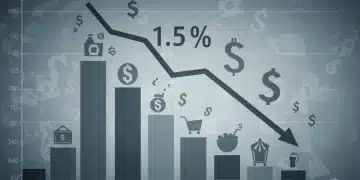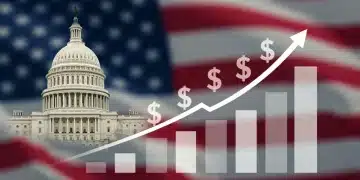Managing credit card debt effectively: tips for success

Managing credit card debt effectively involves creating a budget, exploring consolidation options, making timely payments, and improving your credit score to regain financial control.
Managing credit card debt effectively can feel overwhelming, but you’re not alone. Many people struggle with it. What if you could regain control and improve your financial situation? Let’s explore some practical strategies to help you navigate this challenge.
Understanding credit card debt
Understanding credit card debt is essential for anyone looking to regain their financial footing. Credit cards can provide convenience and purchasing power, but they can also lead to overwhelming debt if not managed carefully. Knowing the ins and outs of credit card debt can help you make informed decisions.
What is Credit Card Debt?
Credit card debt occurs when you carry a balance on your credit card beyond its due date. This debt accumulates interest, which can grow quickly. Understanding how this works can save you money in the long run.
Common Reasons for Credit Card Debt
- Impulse purchases and lifestyle inflation
- Unexpected expenses like medical bills
- Job loss or reduced income
- Lack of a budget or financial plan
Many people fall into the trap of relying on credit cards for regular expenses. This habit can spiral out of control, especially if you’re only making minimum payments. To break this cycle, it’s important to create a budget that prioritizes paying off your debt.
Additionally, knowing your credit limit helps prevent overspending. Staying within your limits ensures you can pay off your balance without incurring extra fees. If you find yourself struggling to manage your debt, consider reaching out for help. Financial advisors can provide guidance tailored to your situation.
How to Manage Credit Card Debt
Managing credit card debt effectively begins with understanding the total amount owed and the interest rates attached to each card. By doing this, you can prioritize which debts to pay off first. Many people benefit from methodical approaches, like the avalanche or snowball methods, to chip away at their balances.
- Focus on high-interest debts first
- Consider making larger payments when possible
- Avoid new purchases while paying off debt
- Set up reminders for due dates to avoid late fees
By taking these steps, you empower yourself to make better financial decisions and reduce your credit card debt.
Effective budgeting strategies

Effective budgeting strategies are crucial for anyone looking to manage credit card debt successfully. By creating a budget, you not only track your spending but also prioritize your financial goals. This process can help you identify where you can cut back and save more.
Creating a Realistic Budget
The first step in effective budgeting is to understand your income and expenses. Start by listing all sources of income, including your salary and any side jobs. Next, outline your fixed expenses like rent and utilities. This clarity will provide a solid foundation for your budget.
- Determine your total monthly income
- List all recurring expenses
- Include variable expenses like groceries and entertainment
- Set aside funds for savings and debt repayment
With this information, you can begin to allocate your funds properly. It’s important to track your spending throughout the month. This helps ensure you stick to your budget and adjust as needed.
Using the 50/30/20 Rule
An effective method many people use is the 50/30/20 budgeting rule. This strategy divides your income as follows: 50% for needs, 30% for wants, and 20% for savings and debt repayment. This simple guideline makes budgeting straightforward and achievable.
- Needs: housing, food, utilities
- Wants: dining out, hobbies, entertainment
- Savings & Debt Repayment: emergency funds and credit card payments
Following this rule helps maintain balance in your finances while ensuring you’re also addressing your credit card debt.
Being flexible with your budget is key. Life can be unpredictable, so it’s important to review and adjust your budget regularly. For example, if you have a month with unexpected car repairs, you may need to cut back on discretionary spending. This adaptability will help you stay on track with your financial goals.
Consolidation options explained
Consolidation options can be a lifesaver for those trying to manage credit card debt. By combining multiple debts into a single payment, you simplify your finances and often reduce your interest rates. Understanding these options is essential for effective debt management.
What is Debt Consolidation?
Debt consolidation means taking out a new loan to pay off existing debts. This approach can streamline your payments, making it easier to manage monthly obligations. It’s important to consider the terms of the new loan to ensure it’s a better deal than your current debts.
- Lower interest rates can save money
- Single monthly payment reduces complexity
- Improved credit score potential with timely payments
However, debt consolidation is not a one-size-fits-all solution. It’s essential to evaluate whether it fits your financial situation. Looking at your income, expenses, and overall debt levels can help you make this decision.
Types of Debt Consolidation
There are several paths you can take for debt consolidation. The most common include personal loans, balance transfer credit cards, and debt management plans. Each has its own benefits and drawbacks.
- Personal Loans: These are unsecured loans used to pay off credit cards. They often have lower interest rates than credit cards, making them a popular option.
- Balance Transfer Credit Cards: These allow you to transfer high-interest debt to a card with a lower or zero introductory rate. This can significantly reduce the interest you pay, but be mindful of fees.
- Debt Management Plans (DMPs): Offered by credit counseling agencies, DMPs consolidate your bills into one payment while negotiating lower interest rates with your creditors.
When exploring these options, it’s important to look at associated fees and terms. Some solutions may include initial costs or commitments that could affect your finances down the road.
Ultimately, the goal is to choose a strategy that not only helps reduce your credit card debt but also improves your overall financial health. Take your time to research, and consider consulting with a financial advisor to find the best path for you.
Tips for improving your credit score

Improving your credit score is essential for managing credit card debt and achieving financial stability. A higher credit score can lead to lower interest rates and better loan terms, making it easier to borrow money when you need it.
Understanding Credit Scores
Your credit score is a numerical representation of your creditworthiness. It typically ranges from 300 to 850, indicating how likely you are to repay creditors. Factors that affect your score include payment history, credit usage, and length of credit history.
- Payment History: Making timely payments has a significant impact.
- Credit Utilization: Keeping your credit utilization below 30% helps improve your score.
- Length of Credit History: A longer credit history can be beneficial.
Regularly checking your credit report can give you insight into what’s helping or hurting your score. You can obtain a free report once a year from each of the major credit bureaus.
Practical Tips for Improvement
There are specific actions you can take to improve your credit score. Consistent, positive habits can lead to gradual improvements over time.
- Pay your bills on time. Set reminders or automatic payments to avoid late fees.
- Reduce high credit card balances to lower your credit utilization ratio.
- Avoid opening multiple new accounts at once, as this can negatively impact your score.
- Regularly monitor your credit report for errors and dispute inaccuracies.
Remember, improving your credit score takes time and effort. Each positive change you make builds towards a stronger financial future. Staying disciplined and proactive in your financial habits will set you on the right path.
Your credit score is a crucial element of your financial life, so treat it with care. By following these tips, you not only work towards improving your score but also strengthen your overall financial health.
FAQ – Frequently Asked Questions about Managing Credit Card Debt
What is credit card debt consolidation?
Credit card debt consolidation is the process of combining multiple debts into one single loan. This can simplify payments and often result in a lower interest rate.
How can I improve my credit score?
You can improve your credit score by making timely payments, reducing your credit utilization, and regularly checking your credit report for errors.
What budgeting strategies are effective for managing debt?
Effective budgeting strategies include creating a detailed budget, using the 50/30/20 rule, and tracking your spending to identify areas to cut back.
When should I consider seeking help for my credit card debt?
Consider seeking help if you’re struggling to make payments, unsure how to manage your debt, or facing financial difficulties. A financial advisor can provide tailored guidance.





